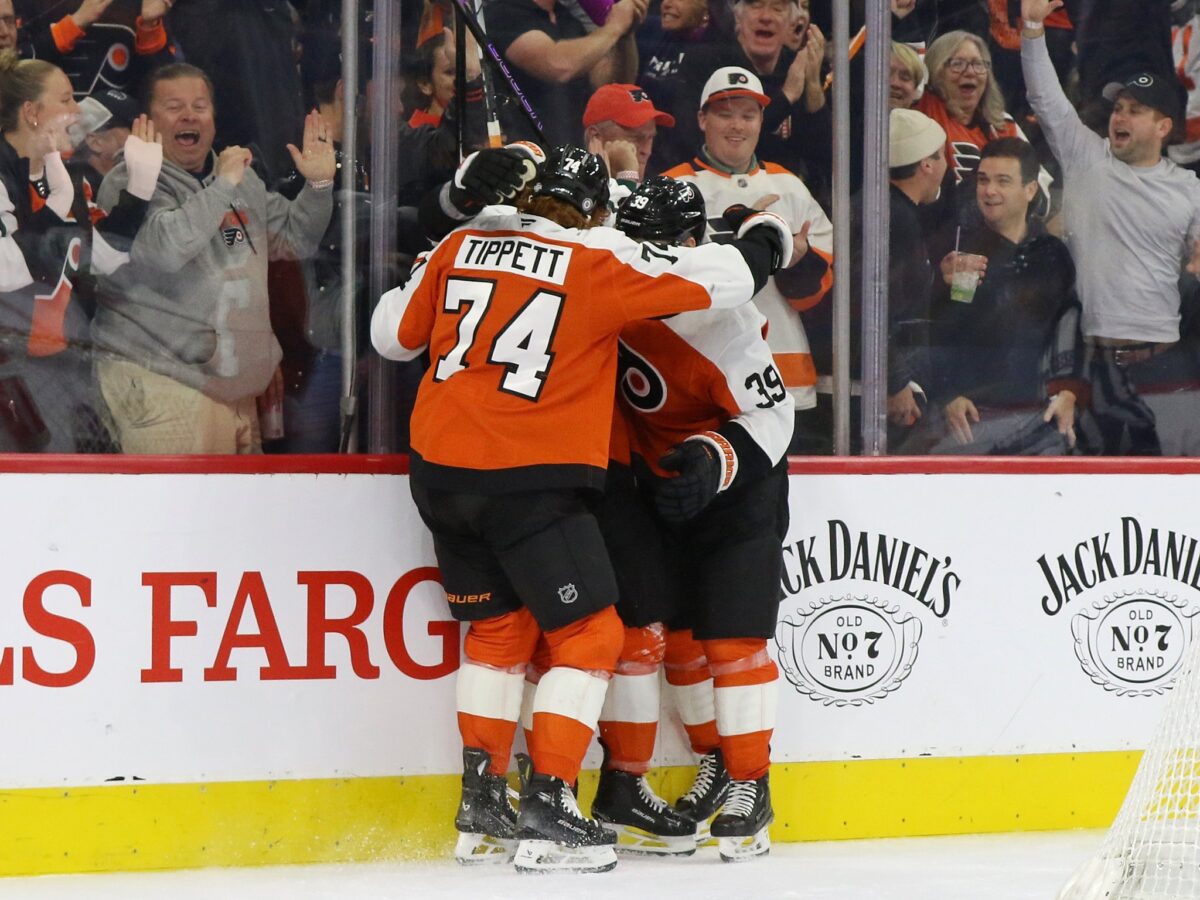Early in their 2024-25 season, the Philadelphia Flyers tried any and every forward line combination to find something that could stick. For the most part, they failed in their efforts.
Over the past nine games, however, the Flyers haven’t moved anyone around much at all. That’s because they’ve finally found the right mix—there’s been no need to pivot. The trio that has objectively been the best is reminiscent of another, concocted a decade ago by a completely different franchise. How do these formations compare?
Is Tippett-Frost-Michkov the New Triplets Line?
One of the main goals for the Flyers this season was to get rookie Matvei Michkov acclimated in the NHL. So far, so good.
With 27 points in 28 games on 17:01 of average ice time, Michkov’s 3.40 points per 60 minutes put him in elite company. Among 20 and under skaters with at least 20 games played, only Sidney Crosby, Alex Ovechkin, Connor McDavid, Evgeni Malkin, and Mathew Barzal reached that mark. That total will fluctuate, but he’s putting up some jaw-dropping numbers right now.
Two players in particular have helped activate the best out of him: Owen Tippett and Morgan Frost. Head coach John Tortorella has been running the three together for the past nine games, which has brought about some wonderful results. It’s very similar to another memorable line led by a then-budding Russian superstar.

A few months ago, I looked at the Tampa Bay Lightning’s “Triplets Line”, formed in 2014-15, as a possible parallel for Michkov. Youngsters Ondrej Palat, Tyler Johnson, and Nikita Kucherov, though a second line, were one of the most dangerous in the entire league.
Related: Do the Flyers Need to Provide Matvei Michkov with an Elite Center?
Kucherov, the feature of the line, just needed players he could mesh with to be a deadly force. Palat and Johnson were undoubtedly pretty good, coming off campaigns of 50-plus points, but Kucherov unlocked something in them. They weren’t Ovechkin and Crosby, but that kind of talent wasn’t necessary to be productive.
The trio was unstoppable behind the security blanket of Steven Stamkos on the top line, allowing for a one-two punch in Tampa Bay. The team reached the Stanley Cup Final after having the NHL’s third-worst record just two seasons prior. Soon after, Kucherov blossomed into one of the best players in the league.
The Tippett-Frost-Michkov line has a similar philosophy. Michkov is that budding Russian superstar, while Tippett and Frost are the supporting cast. The Flyers need to acquire a top center for the rookie at some point in his career, sure, but what they have now has been quite the treat. Their numbers compared to the Triplets Line are below:
| Stat (5-on-5) | Palat-Johnson-Kucherov (2014-15) | Tippett-Frost-Michkov (2024-25) |
| Expected Goals Per 60 (xGF/60) | 2.95 | 2.86 |
| Expected Goals Against Per 60 (xGA/60) | 1.96 | 1.93 |
| Expected Goals Percentage (xGF%) | 60.07% | 59.71% |
| Goals Percentage (GF%) | 67.61% | 81.82% |
| Total Ice Time | 672:55 | 112:07 |
Aside from the unsustainably high finishing rate on the Flyers’ side, you can see some similarities here. Better yet, the Tippett-Frost-Michkov combination was tried earlier in the 2024-25 campaign with poor results—those older shifts are actually hurting the numbers here. They’ve taken off recently, and it has been beautiful to watch on the ice. There’s a level of chemistry brewing that has helped all three of them play their best hockey all season long.
To answer the question this heading posed, there is a bit of a throwback here. Getting the best results out of Michkov (and his linemates as a result) has been possible with this new-found gold mine. No dominant center has been needed.
Flyers Can Ride This Line to the Playoffs
At 14-12-4, the Flyers find themselves in a playoff spot after losing nine of their first 13 contests of the season. Considering their positive momentum and the sharp play of the Tippett-Frost-Michkov line, the postseason is a real possibility.
In their promising stretch, the Flyers have been far from lucky. One of the biggest luck-based measures in the NHL is PDO, which is the sum of shooting percentage and save percentage. Philadelphia is 14th in the metric since Nov. 7, yet has the sixth-best points percentage in the league during that span.
The Orange and Black only need their goaltending to be passable, proven by their .893 team save percentage in that 17-game sample. The second line can provide the explosiveness, while the first line of Joel Farabee, Sean Couturier, and Travis Konecny can eat loads of minutes and simultaneously win them (66.67 GF%, 53.34 xGF%).
With the defense being the healthiest it has been all season and playing at a high level, the Flyers are in a great spot. They still have holes, of course, but few teams have had a better stretch than they have over the past few weeks. The second line is the most important in making the playoffs a reality.
The Flyers haven’t played postseason hockey at Wells Fargo Center since 2018. Their young but effective second line might be able to change that, though. With similarities to the Triplets Line of 2014-15, it might be what puts the Orange and Black over that playoff hump.
Stats courtesy of Natural Stat Trick (unless specified otherwise)
